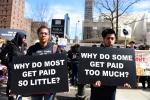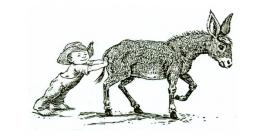
Kim Moody reviews John Womack Jr.’s book “Labor Power and Strategy” and responses to his contributions, focused on the significance of workers’ positional power in labor struggles.
KIM MOODY was a founder of Labor Notes. He now lives in the UK where he is a member of the National Union of Journalists and Visiting Scholar at the University of Westminster in London. His most recent books are How Capital is Reshaping the Battleground of Class War (Haymarket Books, 2017) and of Breaking the Impasse: Electoral Politics, Mass Action & The New Socialist Movement in the United States (forthcoming, Haymarket).

Kim Moody reviews John Womack Jr.’s book “Labor Power and Strategy” and responses to his contributions, focused on the significance of workers’ positional power in labor struggles.

By now you will have read about the strikes of 2021. For one thing, there are more of them, some in industries where we haven’t seen many strikes for a while like retail, entertainment, or major manufacturing firms; others in . . .

Union democracy or more accurately the transformation of major unions into living democratic participatory organizations and cultures is a necessity precisely because of the corporations’ massive powers of resistance.

Does the history of Minnesota’s Farm-Labor Party in the 1920s and 1930s hold any lessons for socialists today? Kim Moody responds to an article by Eric Blanc.

It was probably no surprise that Joe Biden announced that the huge victory for Boris Johnson and the Conservatives and the mauling defeat of Labour under Jeremy Corbyn’s radical leadership was a warning to fellow Democrats to shun the leftism . . .

There is something politically familiar in Cedric Johnson’s two essays in Catalyst (Vol. 1, No. 1, Spring 2017) and New Politics (No. 66, Winter 2019). Because his political conclusions are very general, even vague, ones that build “on broad solidarity . . .
Dornbush, Elliott-Negri, and Lewis are right that ideology is not enough and an analysis of “the actual, material terrain” is necessary. Simply repeating the well-known realities of the first-past-the-post U.S. electoral system that favors the two-party duality is not such an analysis. It’s old news. Not altogether wrong, but still yesterday’s political science.
 Some New Politics readers will recognize the title of this article as a paraphrase of Hal Draper’s “Two Souls of Socialism,” which appeared in New Politics in 1966. The first version, however, appeared in the socialist student magazine Anvil in 1960, just as a new generation of youthful activists was emerging, inspired to a large extent by the civil rights movement.
Some New Politics readers will recognize the title of this article as a paraphrase of Hal Draper’s “Two Souls of Socialism,” which appeared in New Politics in 1966. The first version, however, appeared in the socialist student magazine Anvil in 1960, just as a new generation of youthful activists was emerging, inspired to a large extent by the civil rights movement.

Capitalism in the United States and across the world has gone through a series of mind-bending crises, spatial “fixes,” and continuous restructurings that have disoriented organized labor in most of the developed economies since the beginning of the neoliberal era in the late 1970s and early 1980s.

In his article calling on socialists to run in Democratic primaries, Daniel Moraff argues that some of the barriers to running candidates in Democratic primaries, such as money and incumbency, also apply to third parties. So they do. He points to the fact that socialist and community organizer Debbie Medina got 40.56% of the vote in the 2016 NY State Senate race in Brooklyn’s 18th District as opposed to 13% for a Green candidate for mayor in Baltimore. So, it’s easier to run as a Democrat.
BY NOW IT SEEMS CLEAR that the United States has entered a new period of contradictory trends that presents a profound challenge to organized labor. First there is the deepening world recession that is bringing down some of American capitalism’s most high profile institutions from Wall Street to Detroit. At the same time, of course, it is wiping out millions of jobs, 4.4 million from December 2007 to February 2009.